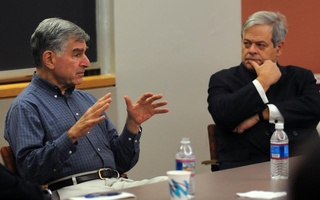He was also the principle architect of “the Big Dig,” which attempted to alleviate the traffic that cut through Boston.
In the words of A. Paul Cellucci, a former Republican governor of Massachusetts, the Big Dig “beautified the city of Boston, eased traffic flow, and provided easy access to Logan airport for the people of Massachusetts.”
Not all, however, agreed with Dukakis’s fiscal policies.
According to Celucci, Dukakis raised the state income tax from 5 percent to 5.95 percent in a hike that he promised would only be temporary.
“It was clear that in late ’80s things were really getting out of control in terms of the fiscal management of state government,” Celucci said. “Spending was up; taxes were up. People wanted some fundamental changes in the fiscal management of state government.”
PRESIDENTIAL CAMPAIGN
Dukakis said that he had never even considered running for president until he watched the events of the Iran Contra scandal unfold in November 1986.
“I couldn’t believe it,” he said. “The president and vice-president were lying to Congress, misleading the American people, and violating the law—it was appalling.”
And although Dukakis lost the election to George H.W. Bush by a large margin—he garnered 111 electoral votes to Bush’s 426—among the most memorable aspects of 1988 election was Dukakis’s reaction to the “Willie Horton” scandal.
The scandal refers to the 1986 weekend furlough release of Willie Horton, who was serving a life sentence for murder in a Massachusetts prison. Horton did not return to jail after his furlough and subsequently raped a woman twice, after assaulting her fiancé in April 1987.
According to Susan R. Estrich, Dukakis’s campaign manager in 1988, the Willie Horton scandal then became a “surrogate for the question of values” in the election, an instrument for determining whether one was “on the side of the criminal or the victim of the crime.”
Although Dukakis did not institute the Massachusetts furlough program during his tenure, he nevertheless defended it as a means of criminal rehabilitation.
The incident became an opportunity for the Bush campaign—which called him a “Massachusetts liberal” who was far too extreme for the White House—to attack Dukakis’s values.
FACING DEFEAT
Recalling the campaign, Dukakis said he regrets his failure to fight back.
Read more in News
Elizabeth H. DoleRecommended Articles
-
 Dukakis Talks on Media Strategy
Dukakis Talks on Media Strategy -
 Gift Texting = Yummy
Gift Texting = Yummy -
Dukakis Touts Grassroots AngleFormer Mass. Governor Michael S. Dukakis emphasized the importance of grassroots campaign strategies to the future of the Democratic Party during a talk yesterday evening at Harvard Law School.
-
Feb. 7, 1978: Harvard’s Only Snow DayHarvard historically has been reluctant to declare a snow day.
-
 Elizabeth Warren’s Harvard Problem
Elizabeth Warren’s Harvard Problem -
In Defense of DukakisThough the mantle of anti-intellectual populism has been passed from party to party over the years, right now it rests squarely in the hands of the GOP.













